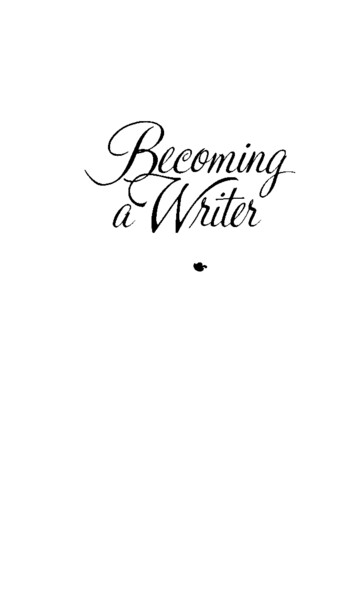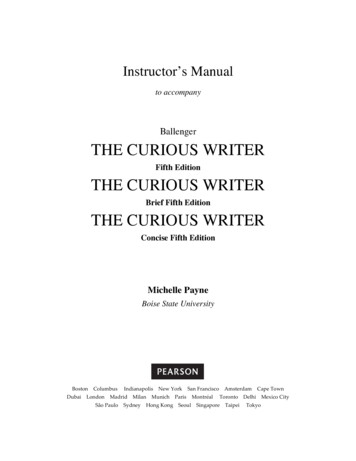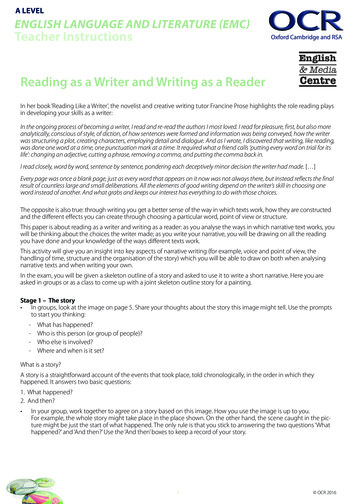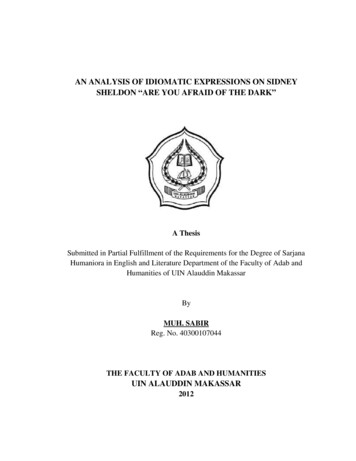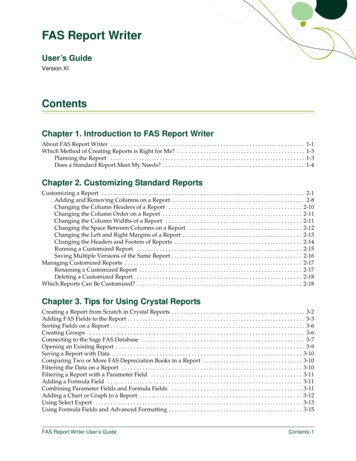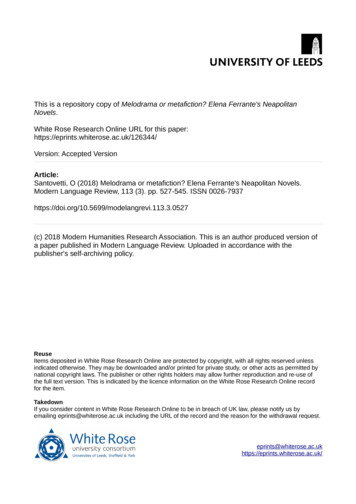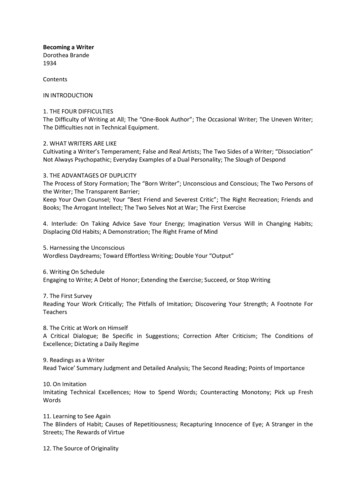
Transcription
Becoming a WriterDorothea Brande1934ContentsIN INTRODUCTION1. THE FOUR DIFFICULTIESThe Difficulty of Writing at All; The “One-Book Author”; The Occasional Writer; The Uneven Writer;The Difficulties not in Technical Equipment.2. WHAT WRITERS ARE LIKECultivating a Writer’s Temperament; False and Real Artists; The Two Sides of a Writer; “Dissociation”Not Always Psychopathic; Everyday Examples of a Dual Personality; The Slough of Despond3. THE ADVANTAGES OF DUPLICITYThe Process of Story Formation; The “Born Writer”; Unconscious and Conscious; The Two Persons ofthe Writer; The Transparent Barrier;Keep Your Own Counsel; Your “Best Friend and Severest Critic”; The Right Recreation; Friends andBooks; The Arrogant Intellect; The Two Selves Not at War; The First Exercise4. Interlude: On Taking Advice Save Your Energy; Imagination Versus Will in Changing Habits;Displacing Old Habits; A Demonstration; The Right Frame of Mind5. Harnessing the UnconsciousWordless Daydreams; Toward Effortless Writing; Double Your “Output”6. Writing On ScheduleEngaging to Write; A Debt of Honor; Extending the Exercise; Succeed, or Stop Writing7. The First SurveyReading Your Work Critically; The Pitfalls of Imitation; Discovering Your Strength; A Footnote ForTeachers8. The Critic at Work on HimselfA Critical Dialogue; Be Specific in Suggestions; Correction After Criticism; The Conditions ofExcellence; Dictating a Daily Regime9. Readings as a WriterRead Twice’ Summary Judgment and Detailed Analysis; The Second Reading; Points of Importance10. On ImitationImitating Technical Excellences; How to Spend Words; Counteracting Monotony; Pick up FreshWords11. Learning to See AgainThe Blinders of Habit; Causes of Repetitiousness; Recapturing Innocence of Eye; A Stranger in theStreets; The Rewards of Virtue12. The Source of Originality
The Elusive Quality; Originality Not Imitation; The “Surprise Ending”; Honesty, the Source ofOriginality; Trust Yourself; “Your Anger and My Anger”; One Story, Many Versions; Your InalienableUniqueness; A Questionnaire13. The Writer’s RecreationBusman’s Holidays; Wordless Recreation; Find Your Own Stimulus; A Variety of Time-Fillers14. The Practice StoryA Recapitulation; The Contagiousness of Style; Find Your Own Style; The Story in Embryo; ThePreparatory Method; Writing Confidently; A Finished Experiment; Time for Detachment; The CriticalReading15. The Great Discovery The Five-Finger Exercises of Writing; The Root of Genius; Unconscious, NotSubconscious; The Higher Imagination; Come to Terms with the Unconscious; The Artistic Coma andthe Writer’s Magic16. The Third Person, GeniusThe Writer Not Dual but Triple; The Mysterious Faculty; Releasing Genius; Rhythm, Monotony,Silence; A Floor to Scrub17. The Writer’s MagicX Is to Mind as Mind is to Body; Hold Your Mind Still; Practice in Control; The Story Idea as theObject; The Magic in Operation; Inducing the “Artistic Coma”; Valedictory18. In Conclusion: Some Prosaic PointersTypewriting; Have Two Typewriters; Stationery; At the Typewriter; WRITE!; For Coffee Addicts;Coffee Versus Mate; Reading; Book andMagazine BuyingBibliographyAddendum: Reading and Writing in the New MillenniumBibliography for Modern Readers
IN INTRODUCTIONFor most of my adult life I have been engaged in the writing, the editing, or the criticizing offiction. I took, and I still take, the writing of fiction seriously. The importance of novels and shortstories in our society is great. Fiction supplies the only philosophy that many readers know; itestablishes their ethical, social and material standards; it confirms them in their prejudices or openstheir minds to a wider world. The influence of any widely read book can hardly be overestimated. Ifit is sensational, shoddy, or vulgar our lives are the poorer for the cheap ideals which it sets incirculation; if, as so rarely happens, it is a thoroughly good book, honestly conceived and honestlyexecuted, we are all indebted to it. The movies have not undermined the influence of fiction. On thecontrary, they have extended its field, carrying the ideas which are already current among readers tothose too young, too impatient, or too uneducated to read.So I make no apology for writing seriously about the problems of fiction writers; but untilabout tow years ago I should have felt apologetic about adding another volume to the writer’sworking library. During the period of my own apprenticeship--, and, I confess, long after thatapprenticeship should have been over—I read every book on the technique of fiction, theconstructing of plots, the handling of characters, that I could lay my hands on. I sat at the feet ofteachers of various schools; I have heard the writing of fiction analyzed by a neo0-Freudian; Isubmitted myself to an enthusiast who saw in the glandular theory of personality determination aninexhaustible mine for writers in search of characters; I underwent instruction from one who drewdiagrams and from another who started with a synopsis and slowly inflated it into a completed story.I have lived in a literary “colony” and talked to practicing writers who regarded their calling variouslyas a trade, a profession, and (rather sheepishly) as an art. In short, I have had firsthand experiencewith almost every current “approach” to the problems of writing, and my bookshelves overflow withthe works of other instructors whom I have not seen in the flesh.But two years ago—after still more years spent in reading for publishers, choosing the fictionfor a magazine of national circulation, writing articles, stories, reviews, and more extended criticism,conferring informally with editors and with authors of all ages about their work—I began, myself,toteach a class in fiction writing. Nothing was further from my mind, on the evening of my first lecture,than adding to the top-heavy literature on the subject. Although I had been considerablydisappointed in most of the books I had read and all the classes I had attended, it was not until Ijointed the ranks of instructors that I realized the true basis of my discontent.That basis of discontent was that the difficulties of the average student or amateur writerbegin long before he has come to the place where he can benefit by technical instruction in storywriting. He himself is in no position to suspect the truth. If he were able to discover for himself thereasons for his aridity the chances are that he would never be found enrolled in any class at all. Buthe only vaguely knows how that successful writers have overcome the difficulties which seem almostinsuperable to him; he believes that accepted authors have some magic, or at the very lowest, sometrade secret, which, if he is alert and attentive, he may surprise. He suspects, further, that theteacher who offers his services knows that magic, and may drop a word about it which will prove anOpen Sesame to him. In the hope of hearing it, or surprising it, he will sit doggedly through a seriesof instructions in story types and plot forming and technical problems which have no relation to hisown dilemma. He will buy or borrow every book with “fiction” in the title; he will read anysymposium by authors in which they tell their methods of work. In almost every case he will bedisappointed. In the opening lecture, within the first few pages of his book, within a sentence or twoof his authors’ symposium, he will be told rather shortly that “genius cannot be taught”; and theregoes his hope glimmering. For whether he knows it or not, he is in search of the very thing that isdenied him in that dismissive sentence. He may never presume to call the obscure impulse to setdown his picture of the world in words by the name of “genius,” he may never dare to brackethimself for a moment with the immortals of writing, but the disclaimer that genius cannot be taught,which most teachers and authors seem to feel must be stated as early and abruptly as possible, is
the death knell of his real hope. He had longed to hear that there was some magic about writing,and to be initiated into the brotherhood of authors.This book, I believe, will be unique; for I think he is right. I think thereis such a magic, and that it is teachable. This book is about the writer’smagic.ONETHE FOUR DIFFICULTIESSo, having made my apologies and stated my belief, I am going, from now on, to addressmyself solely to those who hope to write.There is a sort of writer’s magic. There is a procedure which many an author has come uponby happy accident or has worked out for himself which can, in part, be taught. To be ready to learn ityou will have to go by a rather roundabout way, first considering the main difficulties which you willmeet, then embarking on simple, but stringently self-enforced exercises to overcome thosedifficulties. Last of all you must have faith, or the curiosity, to take one odd piece of advice which willbe unlike any of the exhortations that have come your way in classrooms or in textbooks.In one other way, beside the admission that there is an initiate’s knowledge in writing, I amgoing to depart from the usual procedure of those who offer handbooks for young authors. Openbook after book devoted to the writer’s problems; in nine cases out of ten you will find, well towardthe front of the volume, some very gloomy paragraphs warning you that you may be no writer at all,that you probably lack taste, judgment, imagination, and every trace of the special abilitiesnecessary to turn yourself from an aspirant into an artist, or even into a passable craftsman. You arelikely to hear that your desire to write is perhaps only an infantile exhibitionism, or to be warnedthat because your friends think you are a great writer (as if they ever did!) the world cannot beexpected to share that fond opinion. And so on, most tiresomely. The reasons for this pessimismabout young writers are dark to me. Books written for painters do not imply that the chances arethat the reader can never be anything but a conceited dauber, nor do textbooks on engineering startout by warning the student that because he has been able to make a grasshopper out of two rubberbands and a matchstick he is not to think that he is likely ever to be an honor to his chosenprofession.Perhaps it is true that self-delusions most often takes the form of a belief that one can write;as to that I cannot say. My own experience has been that there is no field where one who is inearnest about learning to do good work can make such enormous strides in so short a time. So I amgoing to write this book for those who are fully in earnest, trusting to their good sense and theirintelligence to see to it that they learn the elements of sentence and paragraph structure, that theyalready see that when they have chosen to write they have assumed an obligation toward theirreader to write as well as they are able, that they will have taken (and are still taking) everyopportunity to study the masters of English prose writing and that they have set up an exigentstandard for themselves which they work without intermission to attain.It may be that it is only my extraordinary good fortune that I have met more writers ofwhom these things are true than deluded imbecile scribblers. But tragically enough I have met anumber of sensitive young men and women who have very nearly been persuaded, because theyhad come up against some of the obstacles to writing which we are shortly going to consider, thatthey were unfit to write at all. Sometimes the desire to write -overcame the humiliation they had toundergo; but others dropped back into a life with no creative outlet, thwarted, and restless. I hopethis book persuades some who are hesitating on the verge of abandoning writing to make a differentdecision.In my experience four difficulties have turned up again and again. I am consulted aboutthem far oftener than I am asked for help in story structure or character delineation. I suspect thatevery teacher hears the same complaints, but that, being seldom a practicing author, he tends to
dismiss them as out of his field, or to see in them evidence that the troubled student has not thetrue vocation. Yet it is the very pupils who are most obviously gifted who suffer from thesedisabilities, and the more sensitively organized they are the higher the hazard seems to them. Yourembryo journalist or hack writer seldom asks for help of any sort; he is off after agents and editorswhile his more serious brother-in-arms is suffering the torments of the damned because of hisinsufficiencies. Yet instruction in writing is oftenest aimed at the oblivious tradesman of fiction, andthe troubles of the artist are dismissed or overlooked.THE DIFFICULTY OF WRITING AT ALLFirst there is the difficulty of writing at all. The full, abundant flow that must be establishedif the writer is to be heard from simply will not begin. The stupid conclusion that if he cannot writeeasily he has mistaken his career is sheer nonsense. There are a dozen reasons for the difficultywhich should be canvassed before the teacher is entitled to say that he can see no signs of hope forthis pupil.It may be that the root of the trouble is youth and humility. Sometimes it is selfconsciousness that stems the flow. Often it is the result of misapprehensions about writing, or itarises from an embarrassment of scruples; the beginner may be waiting for the divine fire which hehas heard to glow unmistakably, and may believe that it can only be lighted by a fortuitous sparkfrom above. The particular point to be noted just here is that this difficulty is anterior to anyproblems about story structure or plot building, and that unless the writer can be helped past itthere is very likely to be no need for technical instruction at all.THE “ONE-BOOK AUTHOR”Second, and far more often than the layman would believe, there is the writer who has hadan early success but is unable to repeat it. Here again there is a cant explanation which is offeredwhenever this difficulty is met: this type of writer, we are assured, is a “one-book author”; he haswritten a fragment of autobiography, has unburdened himself of his animus against his parents andhis background, and, being relieved, cannot repeat his tour de force. But obviously he does notconsider himself a one-book author, or we should hear nothing more from him. Moreover, all fictionis, in the sense used here, autobiographical, and yet there are fortunate authors who go on shaping,recombining, and objectifying the items of their experience into a long series of satisfactory books orstories. No; he is right in considering the sudden stoppage of his gift a morbid symptom, and right,usually, in thinking it can be relieved.It is evident, if this writer had a deserved success, that he already knows something,presumably a great deal, of the technical end of his art. His trouble is not there, and, except byhappy accident, no amount of counsel and advice about technique will break his deadlock. He is, insome ways, more fortunate than the beginner who cannot learn to write fluently, for at least he hasgiven evidence of his ability to set down words in impressive order. But his first impatience at beingunable to repeat his success can pass into discouragement and go on to actual despair; and anexcellent author may be lost in consequence.THE OCCASIONAL WRITERThe third difficulty is a sort of combination of the first two: there are writers who can, atwearisomely long intervals, write with great effectiveness. I have had a pupil whose output was oneexcellent short story each year—hardly enough to satisfy either body or spirit. The sterile periodswere torture to her; the world, till she could write again, a desert waste. Each time she found herselfunable to work she was certain she would never repeat her success, and, on first acquaintance, shevery nearly persuaded me of it. But when the cycle was lived through from start to finish, she alwayswrote again, and wrote well.Here again, no technical instruction can touch the difficulty. Those who suffer from thesesilences in which not one idea seems to arise, not one sentence to come irresistibly to the mind’s
surface, may write like artists and craftsmen when they have once broken the spell. The teacherconsultant must form a definite idea of the root of the trouble and give counsel accordingly. It maybe, again that some notion of waiting for the lightning of inspiration to strike is behind the matter.Often it is the result of such ideals of perfection as can hardly bear the light of day. Sometimes, butrarely, a kind of touchy vanity is at work, which will not risk any rebuff and so will not allow anythingto be undertaken which is not assured in advance of acceptance.THE UNEVEN WRITERThe fourth difficulty actually has a technical aspect: it is the inability to carry a story, vividlybut imperfectly apprehended to a successful conclusion. Writers who complain of this are often ableto start a story well, but find it out of control after a few pages. Or they write a good story so drylyand sparely that all its virtues are lost. Occasionally they can motivate their central actionadequately, and the story carries no conviction.It is quite true that those who find themselves in this pass can be greatly helped by learningabout structure, about the various forms which the story may take, of the innocuous “tricks of thetrade” which will help a story over the stile. But even here the real difficulty has set in long beforethe story form is in question. The author has not the self-confidence necessary to present his ideawell, or he is too inexperienced to know how his characters would act in real life, or he is too shy towrite as fully and emotionally as he needs to write if his story is to come to life. The writer who turnsout one weak, embarrassed, or abruptly told story after another obviously needs something morethan to have his individual manuscripts criticized for him. As soon as possible he must learn to trusthis own feeling for the story and to relax in the telling, until he has learned to use the sure, deftstroke of the man who is master of his medium. So even this dilemma comes down, after all, tobeing a trouble in the writer’s personality rather than a defect in hispersonal equipment.THE DIFFICULTIES NOT IN TECHNICAL EQUIPMENTThose are the four difficulties oftenest met at the outset of an author’s writing life. Almosteveryone who buys books on fiction writing, or takes classes in the art of the short story, suffersfrom one or another of these troubles, and until they have been overcome he is able to get verylittle benefit from the technical training which will be so available valuable to him later. Occasionallywriters are stimulated enough by the classroom atmosphere to turn out stories during the course;but they stop writing the moment that stimulus is withdrawn. An astonishing number who reallywant ardently to write are unable to do even assigned themes, yet they turn up hopefully—sometimes year after year. Obviously they are looking for help that is not being given them; andobviously they are in earnest—ready to spend what time, effort, and money they can to emergefrom the class of novices and “yearners” and take their place among productive artists.TWOWHAT WRITERS ARE LIKEIf these are the difficulties, then we must try to cure them where they arise—in the life andattitudes and habits, in the very character itself. After you have begun to see what it is to be awriter, after you learn how the artist functions and also learn to act in the same way, after you havearranged your affairs and your relations so that they help you instead of hinder you on your waytoward the goal you have chosen, those books on your shelves o the technique of fiction, or thoseothers which set up models of prose style and story structure for emulation, will look quite differentto you, and be infinitely more helpful.This volume is not intended to replace those books on craftsmanship. There are somehandbooks so valuable that no writer should be without them. In the appended bibliography I givethe titles of those I have found most helpful for myself and for my pupils; I have no doubt that thelist could be doubled or trebled to advantage. This book is not even a companion volume to such
works as those; it is a preliminary to them. If it is successful it will teach the beginner not how towrite, but how to be a writer; and that is quite another thing.CULTIVATING A WRITER’S TEMPERAMENTFirst of all, then, becoming a writer is mainly a matter of cultivating a writer’s temperament.Now the very word “temperament” is justly suspect among well-balanced persons, so I hasten to saythat it is no part of the program to inculcate a wild-eyed bohemianism, or to set up moods andcaprices as necessary accompaniments of the author’s life. On the contrary; the moods and tempers,when they actually exist, are the symptoms of the -artist’s personality gone wrong—running off intowaste effort and emotional exhaustion.I say “when they actually exist,” for much of the bumptious idiocy which the average manbelieves is an inalienable part of the artist’s makeup has no being except in the eye of the beholder.He has heard tales of artists all his life, and very frequently he really believes “poetic license” tomean that the artist claims the right to ignore every moral code which inconveniences him. Whatthe non-writer thinks about the artist would be of little account if it did not influence those whowould like to write; they are persuaded against their will and their better sense that there issomething fearful and dangerous in an artist’s life, and some of the very shyness which we haveseen as a mischief-maker comes from their giving too much credence to such popular notions.FALSE AND REAL ARTISTSAfter all, very few of us are born into homes where we see true examples of the artistictemperament, and since artists do certainly conduct their lives—necessarily—on a different patternfrom the average man of business, it is very easy to misunderstand what he does and why he does itwhen we see it from the outside. The picture of the artist as a monster made up of one part vainchild, one part suffering martyr, and one part boulevardier is a legacy to us from the last century,and a remarkably embarrassing inheritance. There is an earlier and healthier idea of the artist thanthat, the idea of the genius as a man more versatile, more sympathetic, more studious than hisfellows, more catholic in his tastes, less at the mercy of the ideas of the crowd.The grain of truth in the fin de siècle notion, though, is this: the author of genius does keeptill his last breath the spontaneity, the ready sensitiveness, of a child, the “innocence of eye” thatmeans so much to the painter, the ability to respond freshly and quickly to new scenes, and to oldscenes as though they were new; to see traits and characteristics as though each were new-mintedfrom the hand of God instead of sorting them quickly into dusty categories and pigeonholing themwithout wonder or surprise; to feel situations so immediately and keenly that the word “trite” ashardly any meaning for him; and always to see “the correspondences between things” of whichAristotle spoke two thousand years ago. This freshness of response is vital to the author’s talent.THE TWO SIDES OF A WRITERBut there is another element to his character, fully as important to his success. It is adult,discriminating, temperate, and just. It is the side of the artisan, the workman, and the critic ratherthan the artist. It must work continually with and through the emotional and childlike side, or wehave no work of art. If either element of the artist’s character gets too far out of hand the result willbe bad work, or no work at all. The writer’s first task is to get these two elements of his nature intobalance, to combine their aspects into one integrated character. And the first step toward thathappy result is to split them apart for consideration and training!DISSOCIATION NOT ALWAYS PSYCHOPATHICWe have all read a great many Sunday “feature stories,” magazine articles, and books ofpopularized psychology; so our first impulse is to shy violently away from the words “dissociation ofpersonality.” A dual personality, to the reader who has a number of half-digested notions about theconstitution of the mind, is an unlucky fellow who should be in a psychopathic ward; or, at the
happiest, a flighty, hysterical creature. Nevertheless, every author is a very fortunate sort of dualpersonality, and it is this very fact that makes him such a bewildering, tantalizing, irritating figure tothe plain man of affairs who flatters himself that he, at least, is all of a piece. But there is no scandaland no danger in recognizing that you have more than one side to your character. The journals andletters of men of genius are full of admissions of their sense of being dual or multiple in their nature:there is always the workaday man who walks, and the genius who flies. The idea of the alter ego, theother self, or higher self, recurs wherever genius becomes conscious of its own processes, and wehave testimony for it in age after age.EVERYDAY EXAMPLES OF DUAL PERSONALITYIndeed, the dual personality of the genius is almost a commonplace. As a matter of fact, it isa commonplace for all of us, to some extent. Everyone has the same experience of acting with adecision and neatness in an emergency which seem later to him to savor of the miraculous; this wasthe figure which Frederick W. H. Myers used to convey his idea of the activity of genius. Or there isthe experience of the “second wind” that comes after long grinding effort, when suddenly fatigueseems to drop away and a new character to arise like a phoenix from the exhausted mind or body;and the work that went so haltingly begins to flow under the hand. There is the obscurer, butcognate, experience of having reached a decision, solved a problem, while we slept, and finding thedecision good, the solution valid. All these everyday miracles bear a relation to genius. At suchmoments the conscious and the unconscious conspire together to bring about the maximum effect;they play into each other’s hands, supporting, strengthening, and supplementing each other, so thatthe resulting action comes from the full, integral personality, bearing the authority of the undividedmind.The man of genius is one who habitually (or very often, or very successfully) acts as his lessgifted brothers rarely do. He not only acts in an event, but he creates as event, leaving his record ofthe moment on paper, canvas, or in stone. As it were, he makes his own emergency and acts in it,and his willingness both to instigate and perform marks him off from his more inert, less courageouscomrades. Everyone who seriously wanted to write has some hint of this. Often it is in the verymoment of vision that the first difficulties arise. Embarkation on the career is easy enough; aninclination to reverie, a love of books, the early discovery that it is not too difficult to turn a phrase—to find any or all of these things in one’ first adolescent consciousness is to believe that one hasfound the inevitable, and not too formidable, vocation.THE SLOUGH OF DESPONDBut them comes the dawning comprehension of all that a writer’s lifeimplies: not easydaydreaming, but hard work at turning the dream into reality without sacrificing all its glamour; notthe passive following of someone else’s story, but the finding and finishing of a story of one’s own;not writing a few pages which will be judged for style or correctness alone, but the prospect ofturning out paragraph after paragraph after paragraph and page after page which will be read forstyle, content, and effectiveness. Nor is this by any means all the beginning writer foresees. Heworries to think of his immaturity, and wonders how he ever dared to think he had a word worthsaying. He gets as stage-struck at the thought of his unseen readers as any sapling actor. Hediscovers that when he is able to plan a story step by step, the fluency he needs to write it has flownout the window; or that when he lets himself go on a loose rein, suddenly the story is out of hand.He fears that he has a tendency to make his stories all alike, or paralyzes himself with the notion thathe will never, when this story is finished, find another that he likes as well. He will begin to followcurrent reputations and harry himself because he has not this writer’s humor or that one’s ingenuity.He will find a hundred reasons to doubt himself and not one self-confidence. He will suspect thatthose who encouraged him are too lenient, or too far from the market to know the standards ofsuccessful fiction. Or he will read the work of a real genius in words, and the discrepancy between
that gift and his own will seem a chasm to swallow his hopes. In such a state, lightened now andagain by moments when he feels his own gift alive and surging, he may stay for months or years.Every writer goes through this period of despair. Without doubt many promising writers,and most of those who were never meant to write, turn back at this point and find a lifework lessexacting. Others are able to find the other bank of their slough of despond, sometimes byinspiration, sometimes by sheer doggedness. Still others turn to books or counselors. But often theyare unable to tell the source of their baffled discomfort; they may even assign the reasons for theirfeeling of fright to the wrong causes, and think that they miss effectiveness because they “cannotwrite dialogue,” or “are no good at plots,” or “make all the characters too stiff.” When they haveworked as intensively as possible to overcome the weakness, only to find that t-heir difficultiescontinue, there comes another unofficial weeding-out. Some drop away from this group; still otherspersist, even though they have reached the stage of dumb discomfort where they no longer feel thatthey can diag
Becoming a Writer Dorothea Brande 1934 Contents IN INTRODUCTION 1. THE FOUR DIFFICULTIES . The Writer Not Dual but Triple; The Mysterious Faculty; Releasing Genius; Rhythm, Monotony, Silence; A Floor to Scrub 17. The Writers Magic X Is to Mind as Mind is to Body; Hold Your Mind Still; Practice in Control; The Story Idea as the .
